- Home
- L. Frank Baum
Aunt Jane's Nieces at Millville
Aunt Jane's Nieces at Millville Read online
AUNT JANE'S NIECES AT MILLVILLE
BY
EDITH VAN DYNE
1908
LIST OF CHAPTERS
I UNCLE JOHN'S FARM II THE AGENT III _MILLVILLE HEARS EXCITING NEWS_ IV ETHEL MAKES PREPARATION V THE ARRIVAL OF THE NABOBS VI PEGGY PRESENTS HIS BILL VII LOUISE SCENTS A MYSTERY VIII THE LITTLE SCHOOL-MA'AM IX THE "LIVES OF THE SAINTS" X THE MYSTERY DEEPENS XI THREE AMATEUR DETECTIVES XII THE BAITING OF PEGGY McNUTT XIII BOB WEST, HARDWARE DEALER XIV THE MAJOR IS PUZZLED XV THE MAN IN HIDING XVI A MATTER OF SPECULATION XVII JOE TELLS OF "THE GREAT TROUBLE"XVIII THE LOCKED CUPBOARD XIX THE COURT'N' OF SKIM CLARK XX A LOST CAUSE XXI THE TRAP IS SET XXII CAUGHT!XXIII MR. WEST EXPLAINS XXIV PEGGY HAS REVENGE XXV GOOD NEWS AT LAST
CHAPTER I.
UNCLE JOHN'S FARM.
"How did I happen to own a farm?" asked Uncle John, interrupting hissoup long enough to fix an inquiring glance upon Major Doyle, whosat opposite.
"By virtue of circumstance, my dear sir," replied the Major, composedly."It's a part of my duty, in attending to those affairs you won't lookafther yourself, to lend certain sums of your money to needy andambitious young men who want a start in life."
"Oh, Uncle! Do you do that?" exclaimed Miss Patricia Doyle, who satbetween her uncle and father and kept an active eye upon both.
"So the Major says," answered Uncle John, dryly.
"And it's true," asserted the other. "He's assisted three or four scoreyoung men to start in business in the last year, to my certainknowledge, by lending them sums ranging from one to three thousanddollars. And it's the most wasteful and extravagant charity I everheard of."
"But I'm so glad!" cried Patsy, clapping her hands with a delightedgesture. "It's a splendid way to do good--to help young men to get astart in life. Without capital, you know, many a young fellow wouldnever get his foot on the first round of the ladder."
"And many will never get it there in any event," declared the Major,with a shake of his grizzled head. "More than half the rascals that Johnhelps go to the dogs entirely, and hang us up for all they've borrowed."
"I told you to help _deserving_ young men," remarked Uncle John, with ascowl at his brother-in-law.
"And how can I tell whether they're desarving or not?" retorted MajorDoyle, fiercely. "Do ye want me to become a sleuth, or engage detectivesto track the objects of your erroneous philanthropy? I just have to forma judgment an' take me chances; and whin a poor devil goes wrong Icharge your account with the loss."
"But some of them must succeed," ventured Patsy, in a conciliatory tone.
"Some do," said John Merrick; "and that repays me for all my trouble."
"All _your_ throuble, sir?" queried the Major; "you mane all _my_throuble--well, and your money. And a heap of throuble that confoundedfarm has cost me, with one thing and another."
"What of it?" retorted the little round faced millionaire, leaning backin his chair and staring fixedly at the other. "That's what I employyou for."
"Now, now, gentlemen!" cried Patsy, earnestly. "I'll have no businessconversation at the table. You know my rules well enough."
"This isn't business," asserted the Major.
"Of course not," agreed Uncle John, mildly. "No one has any businessowning a farm. How did it happen. Major?"
The old soldier had already forgotten his grievance. He quarreledpersistently with his wealthy employer and brother-in-law--whom hefairly adored--to prevent the possibility (as he often confided toPatsy) of his falling down and worshiping him. John Merrick was amulti-millionaire, to be sure; but there were palliating circumstancesthat almost excused him. He had been so busily occupied in industry thathe never noticed how his wealth was piling up until he discovered it byaccident. Then he promptly retired, "to give the other fellows achance," and he now devoted his life to simple acts of charity and thewelfare and entertainment of his three nieces. He had rescued MajorDoyle and his daughter from a lowly condition and placed the former inthe great banking house of Isham, Marvin & Company, where John Merrick'svast interests were protected and his income wisely managed. He hadgiven Patsy this cosy little apartment house at 3708 Willing Square andmade his home with her, from which circumstance she had come to berecognized as his favorite niece.
John Merrick was sixty years old. He was short, stout and chubby-faced,with snow-white hair, mild blue eyes and an invariably cheery smile.Simple in his tastes, modest and retiring, lacking the education andrefinements of polite society, but shrewd and experienced in the affairsof the world, the little man found his greatest enjoyment in the familycircle that he had been instrumental in founding. Being no longerabsorbed in business, he had come to detest its every detail, and soallowed his bankers to care for his fortune and his brother-in-law todisburse his income, while he himself strove to enjoy life in a shy andboyish fashion that was as unusual in a man of his wealth as it wasadmirable. He had never married.
Patricia was the apple of Uncle John's eye, and the one goddessenshrined in her doting father's heart. Glancing at her, as she sat hereat table in her plain muslin gown, a stranger would be tempted to wonderwhy. She was red-haired, freckled as a robin's egg, pug-nosed andwide-mouthed. But her blue eyes were beautiful, and they sparkled with acombination of saucy mischief and kindly consideration for others thatlent her face an indescribable charm.
Everyone loved Patsy Doyle, and people would gaze longer at hersmiling-lips and dancing eyes than upon many a more handsome but lessattractive face. She was nearly seventeen years old, not very tall, andher form, to speak charitably, was more neat than slender.
"A while ago," said the Major, resuming the conversation as he carvedthe roast, "a young fellow came to me who had invented a new sort ofpump to inflate rubber tires. He wanted capital to patent the pump andput it on the market. The thing looked pretty good, John; so I lent hima thousand of your money."
"Quite right," returned Uncle John, nodding.
"But pretty soon he came back with a sad tale. He was in a bad fix.Another fellow was contesting his patent and fighting hard to head himoff. It would take a lot of money to fight back--three thousand, atleast. But he was decent about it, after all. His father had left him alittle farm at Millville. He couldn't say what it was worth, but therewere sixty acres and some good buildings, and he would deed it to you assecurity if you would let him have three thousand more."
"So you took the farm and gave him the money?"
"I did, sir. Perhaps I am to blame; but I liked the young fellow'slooks. He was clean-cut and frank, and believed in his pump. I did more.At the climax of the struggle I gave another thousand, making fivethousand in all."
"Well?"
"It's gone, John; and you've got the farm. The other fellows were tooclever for my young friend, Joseph Wegg, and knocked out his patent."
"I'm so sorry!" said Patsy, sympathetically.
The Major coughed.
"It's not an unusual tale, my dear; especially when John advances themoney," he replied.
"What became of the young man?" asked the girl.
"He's a competent chauffeur, and so he went to work driving anautomobile."
"Where is Millville?" inquired Uncle John, thoughtfully.
"Somewhere at the north of the State, I believe."
"Have you investigated the farm at all?"
"I looked up a real estate dealer living at Millville, and wrote himabout the Wegg farm. He said if any one wanted the place very badly itmight sell for three thousand dollars."
"Humph!"
"But his best information was to the effect that no one wanted it atall."
Patsy laughed.
"Poor Uncle John!" she said.
The little man, however
, was serious. For a time he ate with greatdeliberation and revolved an interesting thought in his mind.
"Years ago." said he, "I lived in a country town; and I love the smellof the meadows and the hum of the bees in the orchards. Any orchards atmy farm, Major?"
"Don't know, sir."
"Pretty soon," continued Uncle John, "it's going to be dreadfully hot inNew York, and we'll have to get away."
"Seashore's the place," remarked the Major. "Atlantic City, orSwampscott, or--"
"Rubbish!" growled the other man, impatiently. "The girls and I havejust come from Europe. We've had enough sea to last us all _this_season, at least. What we pine for is country life--pure milk, appletrees and new mown hay."
"We, Uncle?" said Patsy.
"Yes, my dear. A couple of months on the farm will do all of my niecesgood. Beth is still with Louise, you know, and they must find the citydeadly dull, just now. The farm's the thing. And the Major can run up tosee us for a couple of weeks in the hot weather, and we'll all have aglorious, lazy time."
"And we can take Mary along to do the cooking," suggested Patsy,entering into the idea enthusiastically.
"And eat in our shirt-sleeves!" said Uncle John, with a glowing face.
"And have a cow and some pigs!" cried the girl.
"Pah!" said the Major, scornfully. "You talk as if it were a real farm,instead of a place no one would have as a gift."
Uncle John looked sober again.
"Anyone live on the place, Major?" he inquired.
"I believe not. It's gone to ruin and decay the last few years."
"But it could be put into shape?"
"Perhaps so; at an expense that will add to your loss."
"Never mind that."
"If you want farm life, why don't you rent a respectable farm?" demandedthe Major.
"No; this is my farm. I own it, and it's my bounded duty to live on it,"said Uncle John, stubbornly. "Write to that real estate fellow atMillville tomorrow and tell him to have the place fixed up and put intoship-shape order as quickly as possible. Tell him to buy some cows andpigs and chickens, and hire a man to look after them. Also a horse andbuggy, some saddle horses----"
"Go slow, John. Don't leave such a job to a country real estate dealer.If I remember right the fellow wrote like a blacksmith. If you wanthorses and rigs, let Hutchinson send you down the right sort, with anexperienced groom and stable hands. But I'm not sure there will be aplace to put them."
"Oh, Uncle!" exclaimed Patsy; "don't let us have all those luxuries. Letus live a simple life on the farm, and not degrade its charms by addingcity fixin's. The cow and the chickens are all right, but let's cut outthe horses until we get there. Don't you know, dear, that a bigestablishment means lots of servants, and servants mean worry andstrife? I want to let down the bars for the cow when she moos, and milkher myself."
"It takes a skilled mechanic to milk a cow," objected the Major.
"But Patsy's right!" cried her uncle, with conviction. "We don't wantany frills at all. Just tell your man, Major, to put the place into goodliving condition."
"Patrichia," softly remarked the Major, with an admiring glance at hissmall daughter, "has more sinse in her frizzled head than both of us puttogether."
"If she hadn't more than you," retorted Uncle John, with a grin, "I'dput a candle inside her noodle and call her a Jack-Lantern."

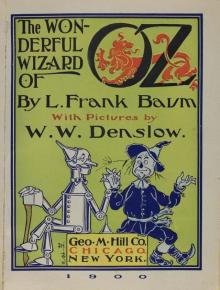 The Wonderful Wizard of Oz
The Wonderful Wizard of Oz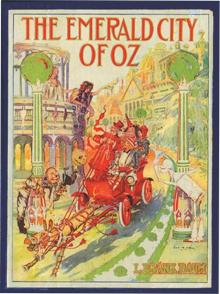 The Emerald City of Oz
The Emerald City of Oz The Story of Peter Pan, Retold from the fairy play by Sir James Barrie
The Story of Peter Pan, Retold from the fairy play by Sir James Barrie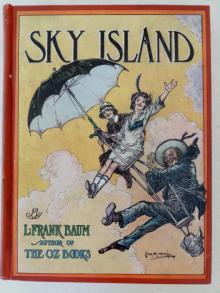 Sky Island
Sky Island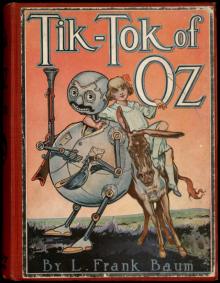 Tik-Tok of Oz
Tik-Tok of Oz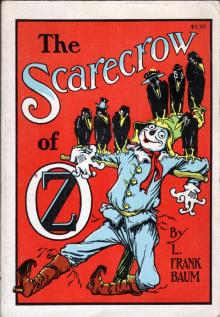 The Scarecrow of Oz
The Scarecrow of Oz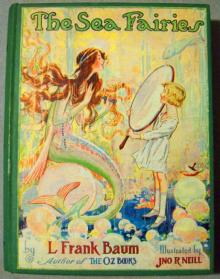 The Sea Fairies
The Sea Fairies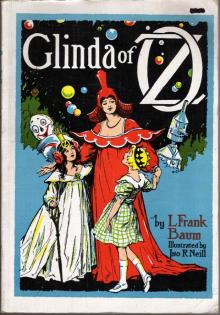 Glinda of Oz
Glinda of Oz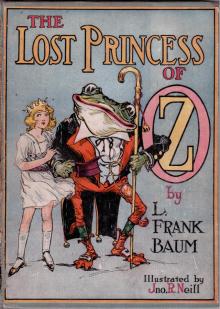 The Lost Princess of Oz
The Lost Princess of Oz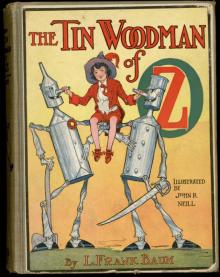 The Tin Woodman of Oz
The Tin Woodman of Oz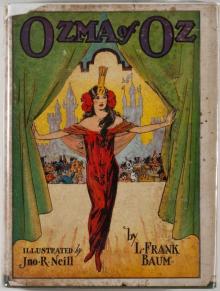 Ozma of Oz
Ozma of Oz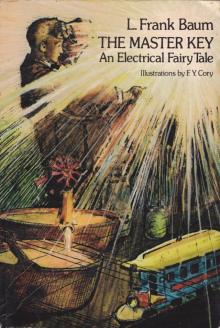 The Master Key
The Master Key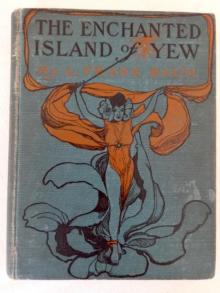 The Enchanted Island of Yew
The Enchanted Island of Yew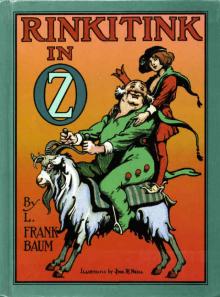 Rinkitink in Oz
Rinkitink in Oz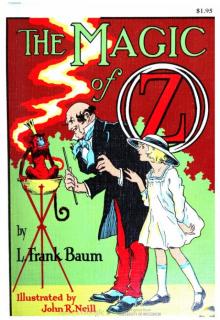 The Magic of Oz
The Magic of Oz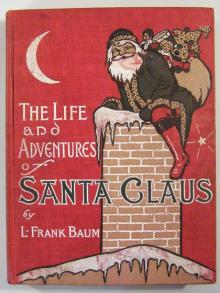 The Life and Adventures of Santa Claus
The Life and Adventures of Santa Claus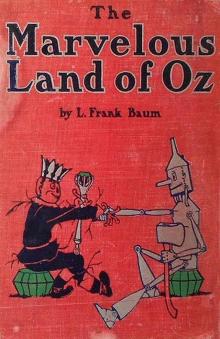 The Marvelous Land of Oz
The Marvelous Land of Oz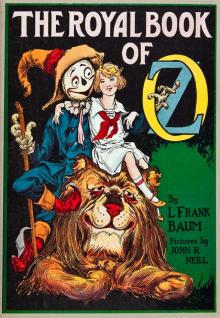 The Royal Book of Oz
The Royal Book of Oz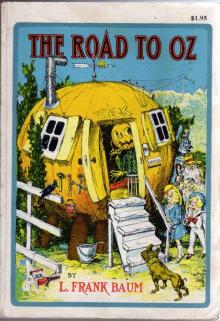 The Road to Oz
The Road to Oz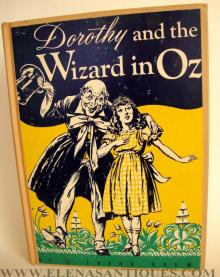 Dorothy and the Wizard in Oz
Dorothy and the Wizard in Oz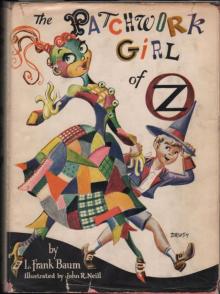 The Patchwork Girl of Oz
The Patchwork Girl of Oz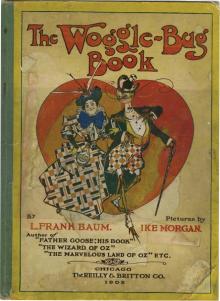 The Woggle-Bug Book
The Woggle-Bug Book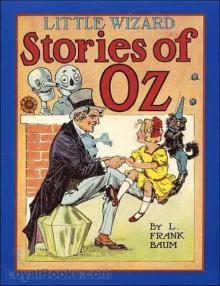 Little Wizard Stories of Oz
Little Wizard Stories of Oz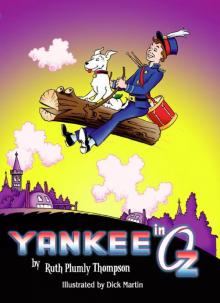 Yankee in Oz
Yankee in Oz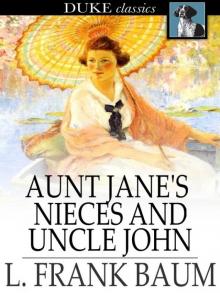 Aunt Jane's Nieces and Uncle John
Aunt Jane's Nieces and Uncle John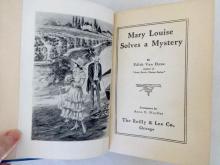 Mary Louise
Mary Louise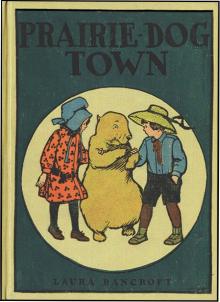 Prairie-Dog Town
Prairie-Dog Town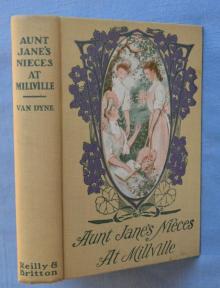 Aunt Jane's Nieces at Millville
Aunt Jane's Nieces at Millville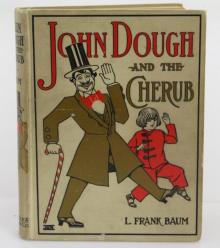 John Dough and the Cherub
John Dough and the Cherub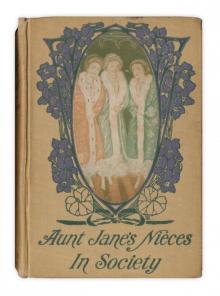 Aunt Jane's Nieces in Society
Aunt Jane's Nieces in Society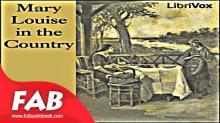 Mary Louise in the Country
Mary Louise in the Country Aunt Jane's Nieces Abroad
Aunt Jane's Nieces Abroad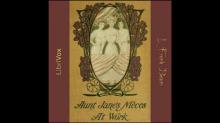 Aunt Jane's Nieces at Work
Aunt Jane's Nieces at Work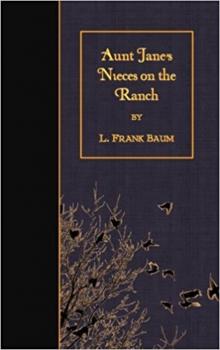 Aunt Jane's Nieces on the Ranch
Aunt Jane's Nieces on the Ranch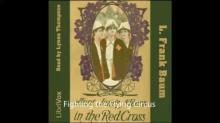 Aunt Jane's Nieces in the Red Cross
Aunt Jane's Nieces in the Red Cross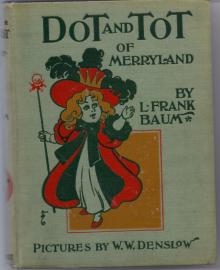 Dot and Tot of Merryland
Dot and Tot of Merryland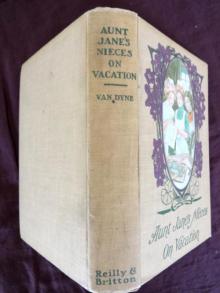 Aunt Jane's Nieces on Vacation
Aunt Jane's Nieces on Vacation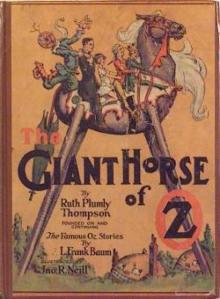 The Giant Horse Of Oz
The Giant Horse Of Oz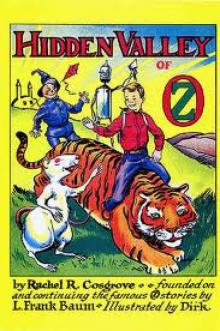 The Hidden Valley of Oz
The Hidden Valley of Oz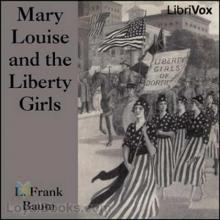 Mary Louise and the Liberty Girls
Mary Louise and the Liberty Girls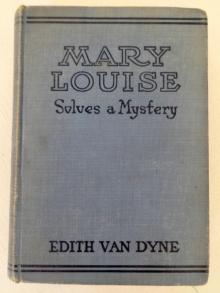 Mary Louise Solves a Mystery
Mary Louise Solves a Mystery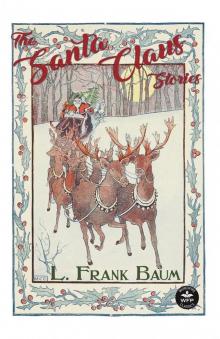 The Santa Claus Stories
The Santa Claus Stories Aunt Judith: The Story of a Loving Life
Aunt Judith: The Story of a Loving Life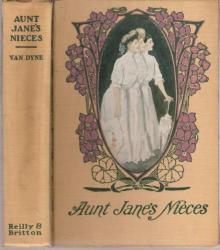 Aunt Jane's Nieces
Aunt Jane's Nieces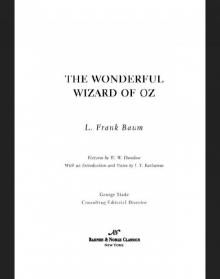 Wonderful Wizard of Oz (Barnes & Noble Classics Series)
Wonderful Wizard of Oz (Barnes & Noble Classics Series) Oz, The Complete Collection
Oz, The Complete Collection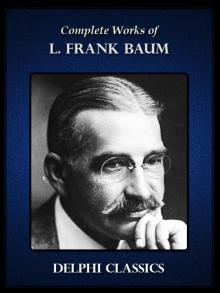 Complete Works of L. Frank Baum
Complete Works of L. Frank Baum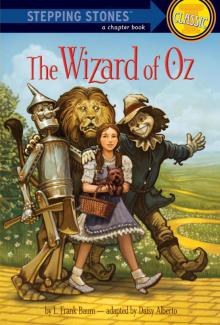 The Wizard of Oz
The Wizard of Oz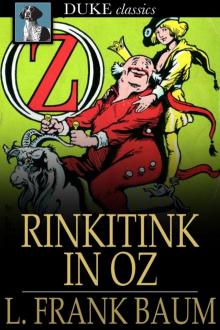 Oz 10 - Rinkitink in Oz
Oz 10 - Rinkitink in Oz